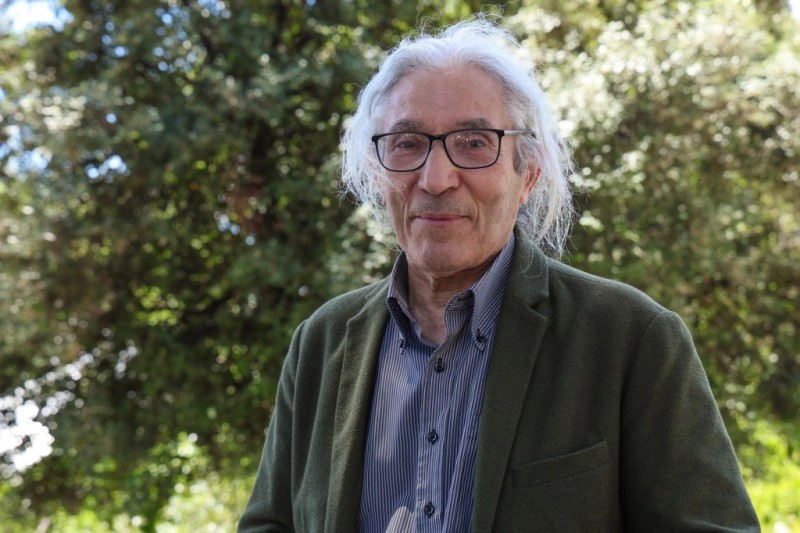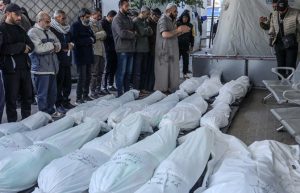France alarmed by disappearance of writer in Algeria
4 min read
Writer Boualem Sansal. credits: Eric Dervaux / Hans Lucas.
France has expressed deep concern over the disappearance of Franco-Algerian writer Boualem Sansal, who has been missing since his arrival in Algiers on Saturday. A prominent critic of the Algerian regime, Sansal, 75, is feared to have been arrested upon stepping off his plane, according to some French media reports.
French President Emmanuel Macron has voiced his concern, with a spokesperson from the Elysée Palace stating that he is closely following the situation and values Sansal’s freedom as a renowned writer and intellectual. Macron’s concern is shared by several French politicians, particularly from the center and right, who have spoken out about Sansal’s disappearance.
Former French Prime Minister Edouard Philippe expressed profound worry, emphasizing that Sansal represents “reason, freedom, and humanism against the forces of censorship, corruption, and Islamism.” Far-right leader Marine Le Pen also voiced her support, calling Sansal a “fighter for liberty and a courageous opponent of Islamism.”
The disappearance of Sansal was first noted by friends in Paris, who reported that his phone had gone dead and that he had failed to arrive at his home in Boumerdès. His supporters, including fellow Franco-Algerian writer Kamel Daoud, have expressed grave concerns for his well-being. Daoud, who was recently awarded France’s prestigious Prix Goncourt for his novel on the Algerian civil war, is another outspoken critic of the Algerian government.
In a statement published in Paris, Daoud described Sansal as a friend and expressed certainty that the writer had been arrested. He wrote, “Being a writer in Algeria is an onerous task. The regime does not at all appreciate the profession, and the Islamists are in expansion mode… Indeed the armed wing [of the Islamists] is the regime.”
The two writers’ struggles have raised suspicions of a broader vendetta by the Algerian government, especially following a shift in France’s policy towards Morocco under President Macron. Last month, Macron visited Morocco and expressed French support for Morocco’s claims over the disputed Western Sahara region, angering Algeria, which has historically supported the Polisario Front’s independence movement in the area.
This shift in French policy, coupled with Macron’s ongoing frustration at Algeria’s refusal to engage in diplomatic dialogue, has added a political dimension to the situation. Some French media speculated that Sansal’s disappearance could be related to a recent interview in which he questioned Algeria’s historic sovereignty over certain territories and criticized the country’s role in destabilizing Morocco. In the interview, Sansal also suggested that Algeria had “invented” the Polisario Front to disrupt Morocco’s stability.
For years, both Sansal and Daoud have faced harsh criticism from the Algerian government. Sansal, a former civil servant and author of several novels, was dismissed from his government position after his first book was published. His attendance at the Jerusalem Book Fair in 2012 led to further condemnation from Algeria, where he is regularly accused of betraying the country’s interests in favor of France.
Daoud, who began his career as a journalist during the brutal Algerian civil war in the 1990s, gained international recognition in 2015 for his novel The Meursault Investigation, a reimagining of Albert Camus’ The Stranger. Daoud’s recent legal troubles in Algeria, where he is being sued for alleged plagiarism and violating the country’s 2005 “reconciliation law” on the civil war, have raised further concerns for his safety.
Antoine Gallimard, the publisher of Daoud’s books, has accused the Algerian regime of orchestrating a “campaign of violent defamation” against the writer. He suggested that the legal attacks on Daoud were part of a broader effort to silence critics of the government, particularly those who are seen as too sympathetic to France.
The situation has put a spotlight on the challenges faced by writers in Algeria, where criticism of the government and Islamism often leads to persecution. Both Sansal and Daoud have been vocal in their opposition to the Algerian regime, but this has come at a great personal cost. Their works have drawn attention to issues of corruption, censorship, and the struggle for free expression in Algeria.
The fate of Boualem Sansal remains uncertain, and his disappearance has prompted widespread condemnation. France’s calls for information about his whereabouts have been met with silence from the Algerian government, raising concerns about the safety of dissenting voices in the country. As the situation unfolds, it remains to be seen whether pressure from France and the international community will lead to any answers or if the Algerian regime will continue its crackdown on writers and critics.






